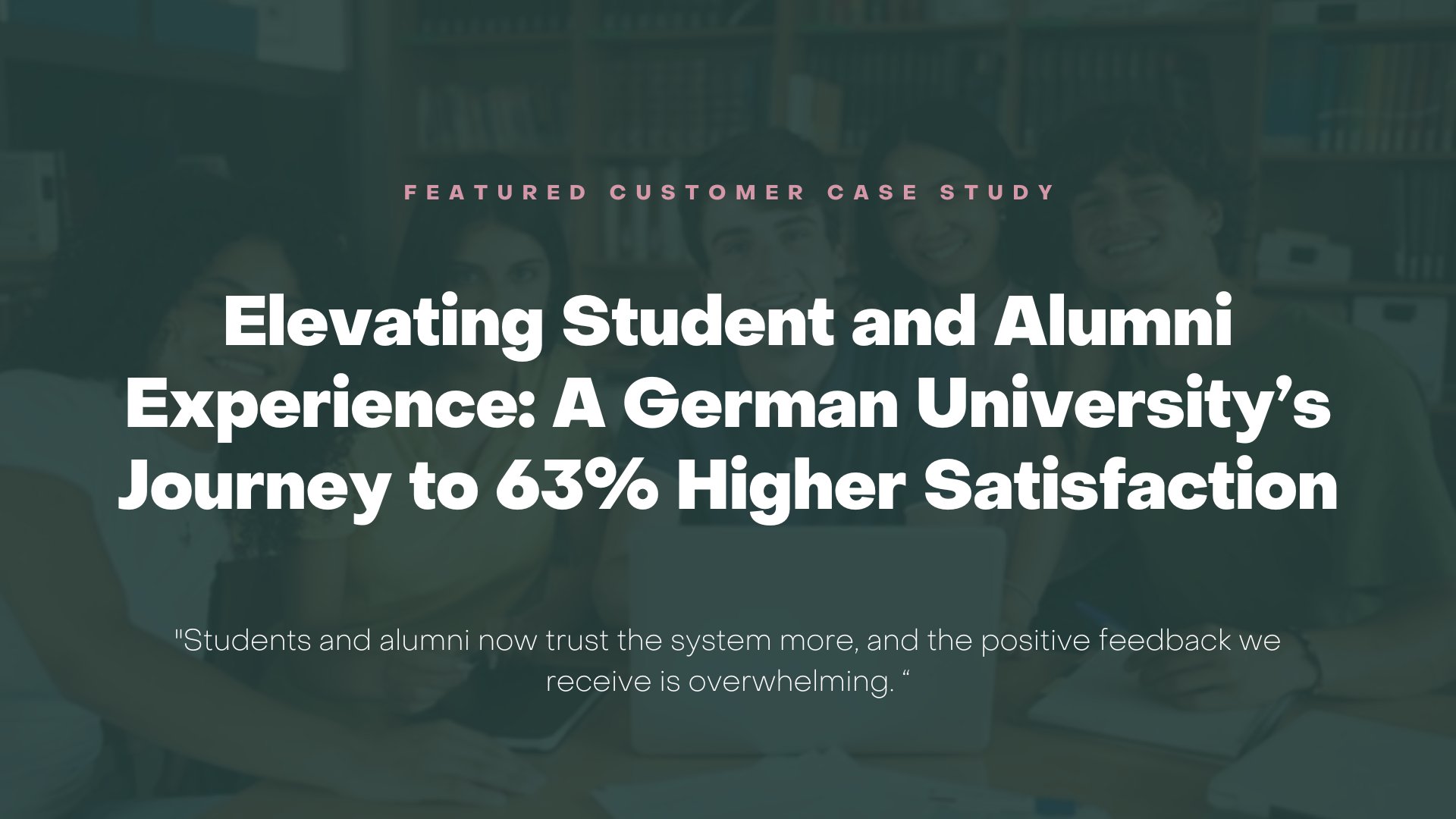Elevating Student and Alumni Experience: A German University’s Journey to 63% Higher Satisfaction

EduTranscript by CertifyMe partnered with a leading university in Germany to revolutionize its academic credentialing system. Serving over 43,000 students across more than 120 degree programs, the university sought a modern solution to improve student and alumni satisfaction while streamlining its transcript processing. With EduTranscript, the institution achieved a 63% increase in satisfaction, positioning itself as a leader in operational excellence within higher education.
Background
The university, a prestigious institution in Münster, Germany faced challenges as its student body continued to grow. Despite offering a diverse range of programs, the transcript management system struggled to keep pace with the increasing demand. The registrar’s office was overwhelmed with the volume of requests, leading to long processing times, frequent inaccuracies in transcripts, and operational inefficiencies. Recognizing the need for a more efficient and scalable solution, the university adopted EduTranscript to modernize its approach to managing academic records.
Challenges
The university faced several operational hurdles in its transcript management system:
-
High Volume of Requests: With over 43,000 students and a large alumni network, the registrar’s office was inundated with transcript requests, particularly during peak periods such as graduation and application seasons.
-
Inefficient Ad-Hoc Processes: Reliance on manual and semi-digital workflows led to inconsistencies, delays, and a lack of standardization in transcript processing. The ad-hoc nature of these processes created bottlenecks and frustrations for both staff and students.
-
Frequent Inaccuracies in Documents: Manual data entry and fragmented processes resulted in frequent inaccuracies in transcript documents, leading to delays and dissatisfaction among students and alumni.
-
Long Processing Times: The transcript processing system, heavily reliant on manual steps, resulted in long delays—sometimes up to 10-15 business days. These delays negatively impacted students needing transcripts for time-sensitive purposes like graduate school or job placements.
-
Decreased User Satisfaction: Slow response times, inaccurate documents, and lack of transparency caused frustration among students and alumni, damaging the university’s reputation for service excellence.
Solutions
To address these challenges, the university adopted EduTranscript, implementing key features to streamline transcript management:
Automated Transcript Workflow
EduTranscript automated the entire process, reducing transcript processing times from 10-15 business days to just 48 hours. By eliminating manual steps, staff were able to focus on more strategic tasks, ensuring greater efficiency.
Scalable Capacity
The platform’s high-volume processing capabilities allowed the university to manage a 47% increase in transcript requests without requiring additional resources. This ensured that the registrar’s office could meet growing demand throughout the year, even during peak periods.
Accurate and Secure Digital Transcripts
EduTranscript introduced tamper-proof, verifiable digital transcripts, significantly reducing inaccuracies. This ensured the delivery of accurate, secure, and globally recognized academic credentials.
Transparency and Improved Communication
Students and alumni gained access to a real-time tracking system, which helped reduce follow-up inquiries by 51% and provided them with transparency throughout the process.
“We’ve gone from manually handling hundreds of inquiries to having a fully automated system that processes thousands of requests smoothly. The feedback from students has been overwhelmingly positive, and seeing the satisfaction rates soar has been incredibly rewarding. We’re now able to meet their needs faster and more accurately than ever before."
– Associate Vice Chancellor for Academic Affairs
Results
The implementation of EduTranscript resulted in exceptional outcomes for the university:
Improved Student and Alumni Satisfaction
The university saw a 63% increase in satisfaction among students and alumni. The new system’s speed, accuracy, and transparency were highly valued, especially for those needing transcripts for time-sensitive purposes such as job applications or further education.
Enhanced Processing Capacity
With EduTranscript, the university increased its transcript processing capacity by 72%, successfully handling thousands more requests annually. The registrar’s office was able to meet critical deadlines consistently, even during peak times.
Faster Processing Times
Processing times were reduced from 10-15 business days to under 20 minutes, significantly improving the service delivery for students. This improvement was particularly appreciated during high-demand periods like graduation and application seasons.
Reduction in Document Errors
The accuracy of transcripts improved drastically, with errors reduced to less than 1%. This was achieved through automated data validation and streamlined processes, which minimized the need for rework and corrections.
Streamlined Administrative Workflow
The automation of the transcript issuance process reduced staff workloads by eliminating manual checks, enabling staff to focus on higher-value tasks. This led to a reduction in staff stress during peak periods and allowed for a smoother operation year-round.
Operational Cost Savings
The university saved approximately €57,000 annually in operational costs and reduced administrative workload by over 960 hours per year. This allowed the registrar’s office to allocate resources to more student-centric initiatives.
"As a result of implementing EduTranscript, we’ve seen a dramatic reduction in student complaints. Students and alumni now trust the system more, and the positive feedback we receive is overwhelming. The platform’s efficiency has allowed us to focus more on supporting students directly, and that’s been an invaluable shift."
– Director of Alumni Affairs and University Relations
.png)